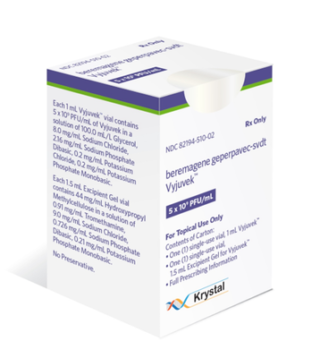Upload your press release
Pittsburgh Life Sciences Manufacturer Receives FDA Approval

Pittsburgh-based biotech company, Krystal Biotech, recently announced FDA approval of a revolutionary and redosable gene therapy to treat dystrophic epidermolysis bullosa (DEB), a rare and severe genetic disease causing highly delicate skin prone to painful blistering and tearing even from minor friction or trauma. This medication is the FDA’s first-ever approved redosable gene therapy and is the only FDA-approved drug for patients with DEB, also known as ‘Butterfly Disease’.
Krystal Biotech, founded in 2016 by scientist Suma Krishnan, set up its headquarters on Pittsburgh's South Side amidst the COVID-19 pandemic. During this time, the company built and stood up two manufacturing facilities: one within the city and another 155,000-square-foot facility near Pittsburgh International Airport – the largest biotech investment in the region to date. With a team of over 225 professionals, the company's primary objective is developing and commercializing genetic medicines for patients with rare diseases. This includes dystrophic epidermolysis bullosa, a rare and incurable disease impacting approximately 1 out of every 20,000 births in the United States.
Pittsburgh, a thriving global life sciences hub, boasts a rich scientific heritage dating back to Dr. Jonas Salk's groundbreaking polio vaccine discovery at the University of Pittsburgh in the 1950s. The city's vibrant ecosystem is fueled by prestigious institutions such as the University of Pittsburgh and Carnegie Mellon University, along with two major healthcare systems, Allegheny Health Network (AHN) and the University of Pittsburgh Medical Center (UPMC).
The region is currently home to 160 life sciences companies – with 60 of them in medical device manufacturing, which is a regional strength resulting from the convergence of two sectors with a history in Pittsburgh: life sciences and manufacturing. Resources, incubator spaces and accelerator programs for life sciences companies include LifeX Labs and Innovation Works’ unique life science-focused accelerator, AlphaLab Health. Pittsburgh’s Innovation District is an additional draw, providing an integrated mix of business, research, and technology in the city’s Oakland neighborhood – Pittsburgh’s academic center.
Other recent notable life sciences announcements include Resilient Lifescience – a Pittsburgh-based startup combating drug overdose with wearable, intelligent drug delivery systems. The company won the Richard King Mellon Foundation (RKMF) social impact pitch competition, securing $500K in funding. Competing against a grouping of 92 diverse companies, Resilient Lifescience’s award will be used to support research and product development. In 2021, Smith+Nephew, a medical technology company, opened its 65,000-square-foot robotics R&D headquarters and medical education training facility in Pittsburgh’s ‘Robotics Row’ district. The facility created a significant number of new jobs and increased the company’s capacity across robotics and medical technology.
Year after year, life sciences continue to grow in Pittsburgh – further showcasing how the region is at the forefront of advancements in biotech, therapeutics, pharma, clinical research and medical devices.
https://www.krystalbio.com/Related Articles
Copyright ©2024. All Rights ReservedDesign, CMS, Hosting & Web Development :: ePublishing